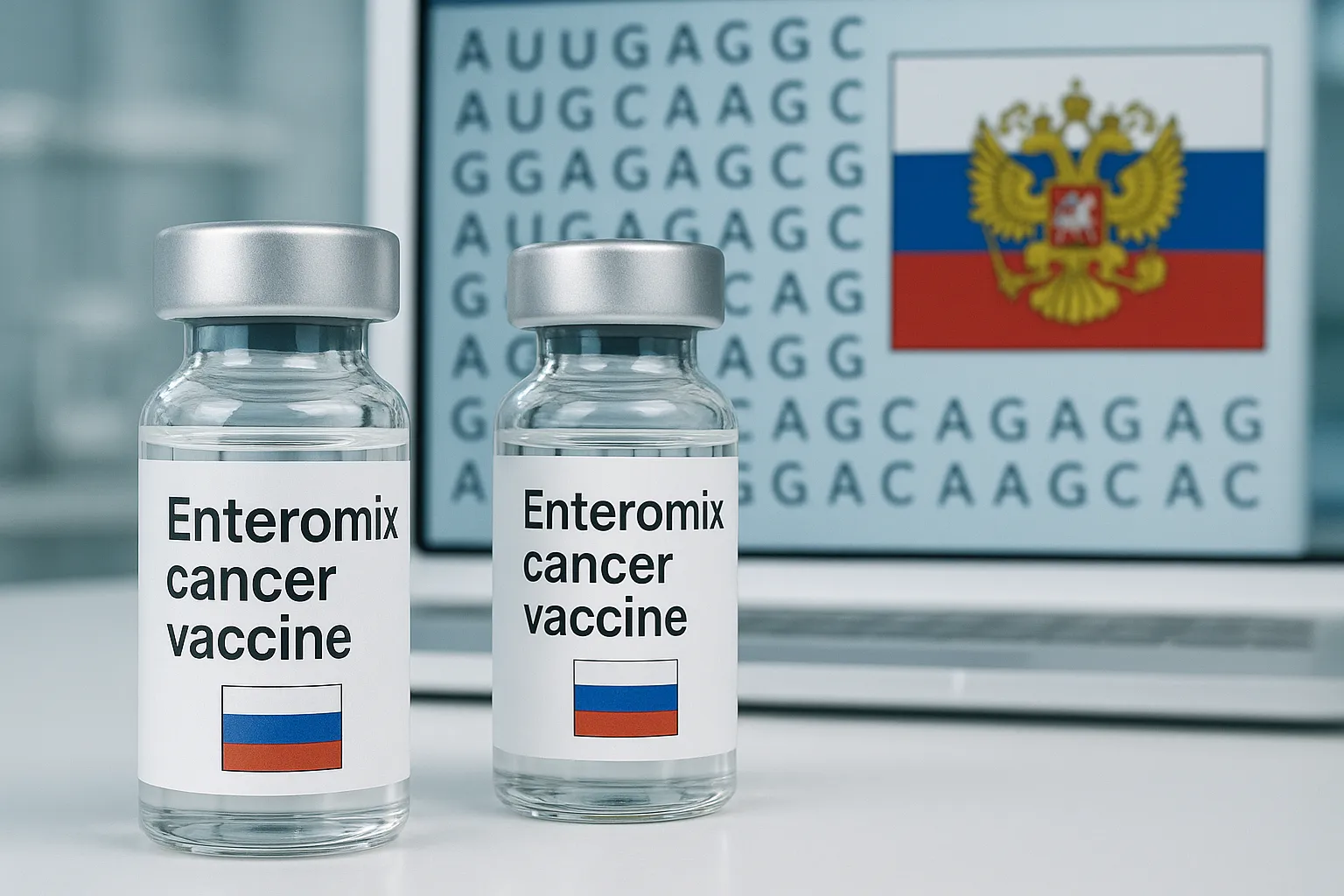Russia Declares Cancer Vaccine Enteromix Ready for Use After Successful Trials

Lead Russia’s Federal Medical and Biological Agency announced today that its mRNA cancer vaccine, Enteromix, has completed preclinical trials showing 60-80% tumor reduction and is now “ready for use,” pending regulatory approval.
Nut Graf The announcement at the Eastern Economic Forum underscores a potential milestone in oncology: a personalized mRNA vaccine aimed initially at colorectal cancer and under development for glioblastoma and melanoma, offering new hope for patients worldwide.
Trial Results
- Safety confirmed: Repeated dosing caused no serious side effects in animal models.
- Efficacy demonstrated: Tumor growth slowed by up to 80%, with 60-80% shrinkage observed across test groups.
- Survival improved: Subjects exhibited higher survival rates compared to controls.
Target Cancers
- Colorectal cancer: First phase will focus on the world’s second leading cause of cancer deaths.
- Glioblastoma: Experimental formulations are in advanced trials for this aggressive brain tumor.
- Melanoma variants: Research includes ocular melanoma and other skin-related forms.
Regulatory Path
- Awaiting approval: FMBA head Veronika Skvortsova confirmed that Enteromix is now subject to Ministry of Health clearance.
- Next steps: Clinical trials in humans are expected to begin within weeks, contingent on data submission and review.
Global Implications
- Personalized oncology: Enteromix leverages patient-specific mRNA sequences, marking a shift from one-size-fits-all therapies.
- Medical breakthrough: Success could pave the way for similar vaccines against various cancers, potentially transforming treatment paradigms.
- International interest: Delegates from over 75 countries at the forum expressed keen interest in collaborating on further development and distribution.
Russia now stands at the forefront of cancer immunotherapy with Enteromix, a move that could redefine global efforts against one of humanity’s deadliest diseases.
Categories
Autos and vehicles Beauty and fashion Business and finance Climate Entertainment Food and drink Games Health Hobbies and leisure Jobs and education Law and government Other Politics Science Shopping Sports Technology Travel and transportationRecent Posts
Gunman Arrested After Country Club Wedding Shooting in Nashua
Trump, Vance Honor Charlie Kirk at Massive Arizona Funeral
DOJ Closes Bribery Probe into Border Czar Tom Homan
Bad Bunny Concludes Puerto Rico Residency with Star-Studded Amazon Livestream
Multiple Shot, Including One Fatality, at Sky Meadow Country Club
Bad Bunny Delivers Historic “Una Más” Livestream Finale from Puerto Rico
‘28 Years Later’ Arrives on Netflix, Three Months After Theatrical Debut
Cyberattack Snarls Check-In Systems at Major European Airports
Premier League Sees Upsets as Liverpool Edges Everton
Chelsea’s Adarabioyo Drafted In After Sanchez Sent Off at Old Trafford
Superman Premieres on HBO Linear Tonight as Streaming Hit
Southern Skies to Darken: Partial Solar Eclipse Looms Tomorrow
Venus’s Square with Uranus Fuels Independence in Today’s Horoscopes
Dublin Airport’s Terminal 2 Evacuated and Reopened After Security Alert
Tell me what happened today 09/20/2025: “tcu” and write it in news format in English.
Clemson University Dismisses Three Employees After Free Speech Controversy
Braun Strowman Unveils USA Network Series and Horror Sequel Role
Noem Launches National ICE Initiative via Social Media
Binance Implements Margin and Leverage Adjustments on September 20, 2025
Spurs Salvage Late Draw at Brighton
Tags
Archives
08/19/2025 (3) 08/20/2025 (40) 08/21/2025 (27) 08/22/2025 (22) 08/23/2025 (4) 08/24/2025 (21) 08/25/2025 (30) 08/26/2025 (24) 08/27/2025 (29) 08/28/2025 (16) 08/29/2025 (9) 08/30/2025 (13) 08/31/2025 (17) 09/01/2025 (167) 09/02/2025 (124) 09/03/2025 (149) 09/04/2025 (112) 09/05/2025 (72) 09/06/2025 (169) 09/07/2025 (162) 09/08/2025 (150) 09/09/2025 (176) 09/10/2025 (194) 09/11/2025 (194) 09/12/2025 (186) 09/13/2025 (207) 09/14/2025 (159) 09/15/2025 (175) 09/16/2025 (198) 09/17/2025 (196) 09/18/2025 (196) 09/19/2025 (207) 09/20/2025 (129) 09/21/2025 (4)